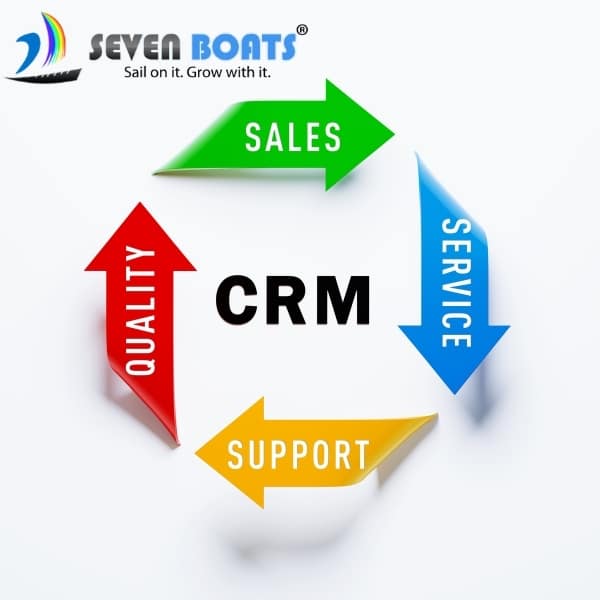A comprehensive guide to CRM and how does it help to grow any business
What is CRM? CRM refers to Customer Relationship Management. As the name suggests, CRM is a software or tool to manage relationships with customers.
For businesses and brands, the most important and crucial asset is their consumers or customers. It’s an essential part of any business to keep all the information of the customers such as – who are they? How have they been introduced to your business? – safely so that you can use the information whenever you need it.
In the early days, companies used to keep the customers’ details in several places haphazardly and it was difficult to find out the required information quickly. When a business grows, it becomes essential to have a dedicated central place where all the detailed information of the customers can be kept easily and safely.
If you don’t bother a central place, your team won’t be able to get answers to some important questions like – who our customers are, how we connect with them first, how they engage with our content, how our new business pipeline looks like, and many more.
Therefore, your customers and prospects will face several issues and challenges while your team can’t meet them on the same page. From their point of view, they want to have a deep relationship with one organization, not a diverse type of individuals or departments.
However, every one of your team should perform the same level of customer service through fulfilling customers’ needs, wants, and solving current challenges. You’ll need to develop a system so that every customer service executive of your team can take care of customers’ issues in the same manner.
A CRM system is designed to solve these problems in a systematic and effective way. Organizing all the information of your existing customers and prospects in a central place will help every customer support executive of your team to assess the status of the relationship with every customer.
Related reading: Marketing Automation
Who should bother with a CRM?
Now, you might be thinking about who can use a CRM, the simple answer is any business or brand that wants to manage a high-level relationship with its customers can benefit from leveraging a CRM system.
Here’re 2 major groups of businesses that often get the most benefits from a CRM system –
- B2C businesses – businesses that deal directly to the customers or consumers such as a realtor, jeweler, and more.
- B2B businesses – businesses that typically require to track leads and follow up a long sales funnel through the customers’ journey such as recruiting farms, software companies, and more.
But apart from these 2 business profiles, there’re a lot more businesses that can gain results from using a CRM system. If you want to know whether your business needs a CRM or not, you may ask some questions to yourself that can be solved by a CRM system –
- Do you need a centralized dedicated place to keep customers’ details to maintain a good relationship with your customers or leads?
- Are your prospects or customers regularly connecting with multiple people on your team? How does every executive can track where the conversation of a customer left off?
- Does your team need a structured system to follow to increase their productivity?
If you feel yes to any of these questions, chances are higher that your business can benefit from a CRM system.
How does a CRM relate to your business growth?
A CRM helps to centralize all the necessary details of the customers and improve relationships with every customer and prospect. Let’s take a look at several points why your business requires a CRM to grow faster.
- Center growth around the customers
as your business grows rapidly, there’s a high chance that your leads may fall into the cracks. But by using a strong CRM system you can easily eliminate the risk factors as it will help you organize everything in a central place.
A CRM helps you to architect your organization as it appears to your target audience and customers. It aligns all of the tasks your marketing, service, and sales team do with a number of tools and integrations. Therefore, it will be very easy for you to collectively center daily tasks and business goals around your customers.
- Align marketing, sales, and support teams
Cross-team alignment is an essential part of growth and success for any business. The mutual alignments among your teams, especially the alignment between the service team and sales team, help every team member to track all the streamlines of the customers’ journey.
By aligning your teams, your internal departments will be able to collect and share necessary customers’ details so they can work as a whole team. In this way, your customers and prospects will get a consistent and seamless support experience that will make them your brand advocates.
A CRM makes this alignment easy and simple with several typical tools and integrated features including marketing, sales, support, CMS, and an integration library.
- Share and sync data easily
It’s a daunting task to manually update the information or record of the customers or leads. A CRM can help you streamline all the time-consuming work such as syncing data and sharing very efficiently.
It doesn’t matter whether your sales representative talks to your prospects or your service representative speaks to your customers, data and records are immediately synced and updated in your CRM system.
By synchronizing all the interactions between a customer or prospect and your team, your team will have the actual records they can easily share from within the platform. This way, your CRM will be a central source of facts when it comes to data. Hence, your team members can create personalized support experiences easily and efficiently.
- Automate daily jobs
A CRM can help you automate your daily jobs that are necessary but need huge energy and time. Automation in the CRM may include several day-to-day tasks like contact records updates and data entry.
Here’s a list of daily jobs you may consider automating in your CRM system –
- Email sequence
- Follow up communication
- Chatbot conversation
- Sales workflows
- Lead nurturing process
- Campaign metrics
- Make workflows
Generally, good CRM systems offer workflows. Workflows are required to complete and organize marketing, sales, and support processes to save you a lot of energy and time.
You can set different criteria that can automatically record and take actions as per your selected command. In your CRM system, you can make workflows for –
- Brands
- Quotes
- Contacts
- Deals
- Offers
- Tickets
- Custom objects
- Ease customer interaction
Nowadays, there’re many options to reach and interact with existing customers and potential buyers online like social media, emails, video calls, and live chats.
CRM solutions have evolved to solve the problems of customer-facing executives and teams. They can integrate several services and channels through which your customers or leads can interact with your organization.
For example, you can integrate –
- Live chat or chatbots – to reply to FAQs and queries.
- Call tracking – to record calls for the future.
- Email tracking – to know about the behavior like open rates and opening time of your customers or leads.
- Video interactions – to send personalized marketing or sales videos and track results.
- Social media tools – to track comments, queries, and brand mentions on social media networks and then directly respond from within the CRM.
- Create reports on the metrics
A CRM can analyze your customer service process and create reports on metrics that are highly valuable to your business. You can customize your reporting features as per your requirement within the CRM system. This allows you to recognize areas of improvement and opportunities to create better customer experiences.
Within your CRM, you can create custom reports and dashboards or you can choose pre-framed features to save your energy and time. You can see reports in real-time, share reports to your team members, or you can automate your reporting emails so they’re sent monthly, weekly, or daily.
Top CRM Tools
- SugarCRM
- SalesForce
- PipeDrive
- HubSpot
- Insightly
- FreshDesk
- Zoho CRM
- Apptivo
- ZenDesk
- Oracle NetSuite CRM
- Microsoft Dynamics 365
- Nimble
- Odoo
- Capsule CRM
- FreshWorks CRM
- Keap
- Scoro
Final words
A CRM system can solve many issues of your business growth. A CRM system is an indispensable part of any business to scale up and achieve goals in today’s fast-paced digital world. It has the power to provide continuous force to your marketing flywheel. If you want to learn practically how a CRM works, you may consider enrolling in our advanced diploma in digital marketing course (ADDM) to learn all the necessary digital marketing skills. Don’t hesitate to contact us if you need more information.









0 Comments